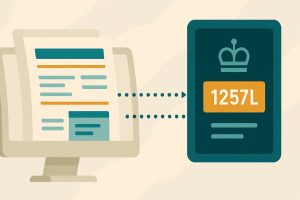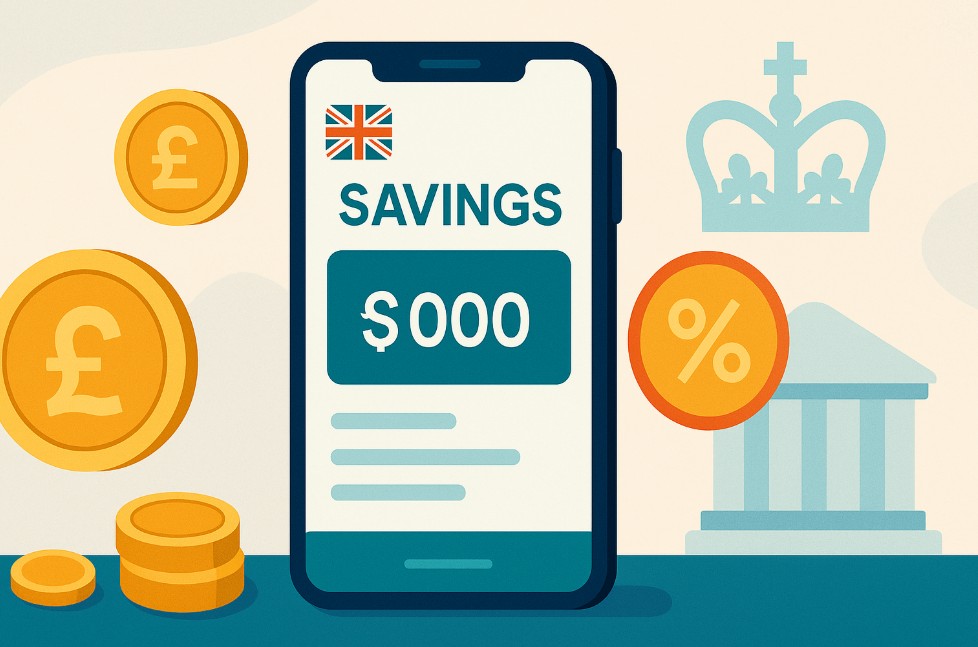Table of Contents
ToggleDo UK savers need to notify HMRC about interest earned from their savings accounts? How much interest can one earn before being taxed? And how exactly does HMRC know how much interest a person has received?
These are common and valid concerns for individuals who are building up their savings, especially as interest rates fluctuate and account balances grow.
While the UK tax system is designed to streamline the process for many savers, there are circumstances where personal responsibility still applies. This guide explains when HMRC automatically handles savings interest tax and when the onus is on the individual to report it.
We also explore the various allowances available, the impact of your employment status, and what steps you should take if you’re self-employed or receive interest from non-UK accounts.
How Does HMRC Know What Interest You’ve Earned?

HM Revenue & Customs (HMRC) receives annual reports from banks, building societies, and other financial institutions regarding the interest earned by account holders. These reports are submitted at the end of each tax year and are linked to individuals using their National Insurance numbers.
This automatic reporting means HMRC already has access to much of the financial data it needs to assess your tax liability. If you’re employed or receive a pension, HMRC may adjust your tax code based on the interest you earned in the previous year.
This allows them to collect any tax due automatically through the PAYE system in the current year.
The process reduces the need for many individuals to submit a Self Assessment return, especially when their savings interest remains below the taxable threshold.
Do You Need to Notify HMRC of Your Savings Interest?
Whether you must notify HMRC about savings interest depends on how much you earn and from where. In many cases, there is no requirement to actively report your savings interest because the information is already passed to HMRC.
However, there are several circumstances where you do need to inform HMRC:
- If you receive interest from foreign accounts or institutions
- If your untaxed income from savings and investments exceeds £10,000 in a tax year
- If you are self-employed and required to complete a Self Assessment return
- If HMRC has not adjusted your tax code and you know your interest exceeds your allowance
In these situations, it’s likely that you will need to either update your tax code or submit a Self Assessment tax return.
How Much Tax-Free Interest Can You Earn?

Most UK taxpayers are entitled to earn a certain amount of interest tax-free each year through various allowances. These include the Personal Allowance, Starting Rate for Savings, and the Personal Savings Allowance (PSA).
Let’s break these down to understand how they work.
Personal Allowance
The Personal Allowance is the amount of income you can earn each year without paying income tax. As of the 2024/2025 tax year, it is set at £12,570. If you have not fully used your Personal Allowance on other income (like wages or pension), the unused portion can be applied to tax-free interest.
Starting Rate for Savings
This allowance allows some low earners to receive up to £5,000 of interest tax-free. However, it only applies if your other income (excluding savings interest) is less than £17,570. For every £1 you earn above your Personal Allowance, your starting rate allowance is reduced by £1.
Example:
If you earn £16,000 in wages:
- Your Personal Allowance covers £12,570.
- The remaining £3,430 in wages reduces your starting rate for savings by £3,430.
- You are left with a starting savings allowance of £1,570.
If your savings interest is less than £1,570, you will not pay any tax on it.
Personal Savings Allowance
This is a key allowance used by the majority of savers. It applies in addition to the above allowances and is based on your income tax band.
| Income Tax Band | Personal Savings Allowance |
| Basic Rate (20%) | £1,000 |
| Higher Rate (40%) | £500 |
| Additional Rate (45%) | £0 |
Interest within this allowance is tax-free. If your interest exceeds it, the surplus becomes taxable at your usual income tax rate.
What Types of Interest Are Included?
The Personal Savings Allowance covers interest from a wide range of sources, including:
- Bank and building society savings accounts
- Credit union savings
- Peer-to-peer lending interest
- Unit trusts and open-ended investment companies
- Corporate or government bonds
- Trust funds and payment protection insurance compensation
- Certain life insurance contracts and annuity payments
Importantly, tax-free savings products such as Individual Savings Accounts (ISAs) and Premium Bonds are not included in these taxable calculations, meaning any interest earned through them is always exempt.
How Is Tax Collected If You’re Employed or Receive a Pension?

If you’re in employment or receive a pension, HMRC will usually collect any tax due on your savings interest by adjusting your tax code. This is based on the amount of interest you earned in the previous year. HMRC will use that figure to estimate your interest for the current year and deduct tax through PAYE.
You may receive a tax calculation letter informing you of either an overpayment or an underpayment. If you don’t receive such a letter by 31 March 2025, you should contact HMRC, especially if you believe you owe tax. Delays or omissions can result in penalties.
What If You’re Self-Employed or Required to File a Self Assessment?
If you submit a Self Assessment tax return, you’re responsible for declaring your savings interest along with other income sources. This is also the method used to pay any tax due on that interest.
You must register for Self Assessment if:
- Your untaxed savings and investment income exceeds £10,000
- You receive foreign interest
- You already complete a tax return for other reasons and have interest to declare
Savings interest is declared in the “interest and dividends” section of the return. You must report the gross amount (i.e., before any tax deductions).
What Happens If You’ve Already Paid Too Much Tax?
In some cases, tax may be deducted or collected unnecessarily, particularly if your savings interest fell below your Personal Savings Allowance. If this happens, you are entitled to reclaim the overpaid tax.
You can:
- Reclaim via your Self Assessment return, if you file one
- Submit form R40 to HMRC for a standalone claim
Claims must be made within four years of the end of the tax year in which the tax was overpaid.
Do You Have to Pay Tax on Foreign or Children’s Savings Accounts?
Interest from foreign bank accounts is not reported automatically to HMRC. Therefore, any such income must be reported via Self Assessment. This includes interest from overseas savings, fixed deposits, and offshore accounts.
It is fully taxable in the UK, and you may be able to claim Foreign Tax Credit Relief depending on the country.
For children’s savings accounts, tax usually isn’t an issue. However, if a parent gifts money to a child and the interest earned exceeds £100 in a tax year, it may be taxed as the parent’s income.
What If You Hold a Joint Savings Account?

With joint accounts, HMRC assumes that interest is split equally between all account holders unless notified otherwise. If the true division of ownership is not equal, you must inform HMRC and provide appropriate documentation to reflect the correct allocation of interest income.
What Should You Do If You Go Over the Allowance?
If your savings interest exceeds the total of your Personal Savings Allowance, Starting Rate for Savings, and any unused Personal Allowance, you must pay tax on the surplus.
The method of tax payment depends on your income type:
- Employed or pensioned: Tax is likely deducted through your tax code
- Self-employed or multiple income sources: Tax must be reported and paid via Self Assessment
Here’s a quick reference:
| Taxpayer Type | Action Required |
| Employed/Pensioned | HMRC adjusts tax code for automatic collection |
| Self-Employed/Investor | Declare via Self Assessment return |
| No PAYE/No Self Assessment | HMRC sends calculation and payment instructions |
Frequently Asked Questions
What happens if I forget to report my savings interest?
You may be fined for failing to disclose taxable income. Always ensure that you review your savings interest annually.
Can HMRC estimate my interest incorrectly?
Yes, estimates are based on previous year figures. If your interest significantly changes, update HMRC or file a return to correct it.
Is interest from ISAs ever taxable?
No. All interest earned in an ISA remains tax-free and doesn’t count toward your PSA.
How do I know if my tax code has been adjusted?
You’ll receive a tax coding notice from HMRC. You can also check your tax code through your personal tax account online.
When do I have to submit a tax return for savings?
If your untaxed interest exceeds £1,000, or any amount if from foreign sources or if you’re already registered for Self Assessment.
Can I avoid paying tax on interest entirely?
Using ISAs and managing your income wisely can help you stay within your tax-free allowances.
What’s the deadline to reclaim overpaid tax?
You have four years from the end of the relevant tax year to submit a claim.
READ MORE:




